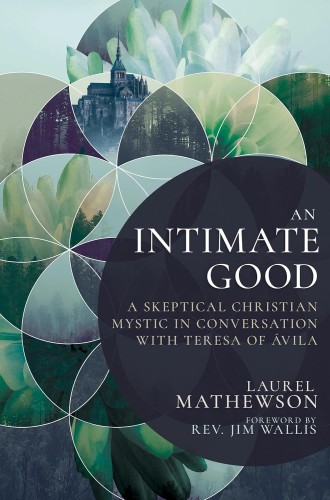Playing the holy fool
Laurel Mathewson introduces new readers to Teresa of Ávila—and to the famed saint’s trustworthy spirituality.

An Intimate Good
A Skeptical Christian Mystic in Conversation with Teresa of Ávila
“Being pious is easy and pleasant, go ahead and make yourself hated,” one holy fool advises another in Eugene Vodolazkin’s 2016 novel Laurus. In Paul’s first letter to the Corinthians, holy fools are “exhibited” in the divine spectacle and, like Christ, are even “sentenced to death” (4:9–10). As a literary archetype, holy fools are subject to contempt and scorn.
Laurel Mathewson plays the contemporary holy fool in An Intimate Good. To suggest as much is to grant what she risks in narrating the mystical prayer encounters that led her to the work of the 16th-century Spanish Carmelite nun. There will surely be raised brows and condescending smirks. Readers who share Mathewson’s “postmodern and materialistic formation” will be scandalized by the piety. More pious readers will be suspicious of her ecstatic experiences, in which prayer progresses—on occasion—from arousal to feelings of penetration.
Read our latest issue or browse back issues.
Mathewson understands her narrative risk—and faces it squarely with the desire to be “diligently truthful,” even if she shares some of Teresa’s literary hesitation. The famed saint had her own run-ins with the proverbial gatekeepers: inquisitors who seized and disposed of every extant manuscript of her first autobiography, The Book of Her Life (also called The Autobiography of Teresa of Ávila). Mathewson understands that to write her own book—and absurdly claim the physical closeness of a good and loving God—is to leave behind an “old model of faith, quite well-suited to the skeptic, the agnostic, the deist, the perfectionist, or the meritocrat of any stripe.” But she will not be the first woman or man or mystic to have gambled with reputation: “Fools for Christ singing praises on street corners or in the fields have had a hard time in every generation.” As with all holy fools, what is revealed is not simply what is seen but also those who see.
Mathewson once maintained a safe intellectual distance from anything resembling St. Teresa’s raptures. An Episcopal priest in parish ministry in San Diego, Mathewson was a “mainline-Protestant mutt,” a do-gooder interested less in the person of Jesus Christ and more in a version of Christianity that served the marginalized and righted wrongs. In many ways, her early faith represented the “adult” persuasions of Enlightenment rationality, as detailed in Charles Taylor’s A Secular Age—God standing at a distance and distractedly minding the world’s affairs. Since that time when our forebears grew out of their childish certitudes, faith has become doubt.
This was especially true for Mathewson, who suffered a litany of life’s brutal, bruising affairs. Her father’s infidelity and her parents’ subsequent divorce. Her mother’s cancer and sudden financial collapse, the medical treatment coinciding with her father’s successful petition to reduce child support payments. There was no explaining where God had been, no defending his goodness and love, when her mother died, heart- and body-broken, leaving behind three children not yet anchored in adulthood.
What does faith do when it is so persistently battered? How many fingers can it spare to plug up the holes of this universe, leaking with so much pain and lament? But this is part of Mathewson’s new understanding of faith, which emerges—like butterfly from chrysalis—as she engages with unlikely biblical texts such as Psalm 45 and meets, in contemplative prayer, Christ as unbidden Bridegroom. Faith isn’t only action and agency, resolution and resolve. To be sure, if the castle and its many dwellings represent the inward journey toward the beating center of God’s presence in the soul, the most outer dwellings are reached by a degree of determination to detach from worldly pleasures and earthly distractions. One must give time and concerted attention to seek and find and knock, that the door may be opened through prayer, lectio divina, and the community of God’s people. But determination isn’t the key to the inner dwellings, which are attained by those who, like children, follow a knowing of another kind. It’s in these dwellings that, according to Mathewson, the gospel is “writ small: our perfection is not required for God’s presence.” Christ opens the door to these dwellings. Christ bids welcome.
Mathewson’s task—introducing new readers to Teresa—is hardly inconsequential. When the book bogs down at times with large block quotes from The Interior Castle, it reliably returns to Mathewson’s winsomely curious and stringently self-scrutinizing narrative voice. What is perhaps most inviting about the book is its unforced humility. According to Teresa, this is the only means of progressing in the spiritual life.
Mathewson is, by her own admission, an inconstant Christian. Like all of us, she comes late and reluctant to prayer. She is busied by life—marriage and parenting and work. And though this busyness is often an impediment to prayer, the everyday responsibilities of life also become Mathewson’s annunciation—God with us in the dishes, in the carpool, in the marital fights about money. I can’t help but trust this account of a woman enraptured by the love of God, just as Mathewson trusts Teresa. “This is a spirituality I can trust,” she writes, taking readers into Teresa’s seventh dwelling. Neither woman advances a spirituality of ascension alone. If the soul is taken in flight from the earth, caught up in the clouds of ecstatic vision and rapture, it is returned—eventually—to the ground and grit of human affairs. The only way to know with any degree of certainty if one has heard God is to test the measure of neighborly love.
“Most prayer is like bird-watching,” Mathewson concludes. “There will be many times when you see or feel nothing, but you are still glad you went out.”





